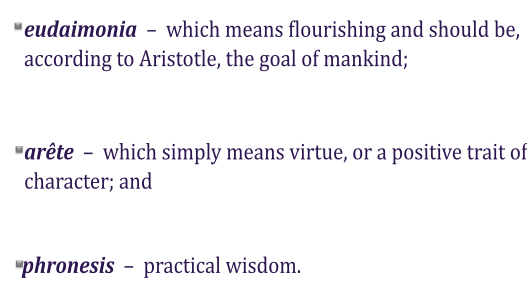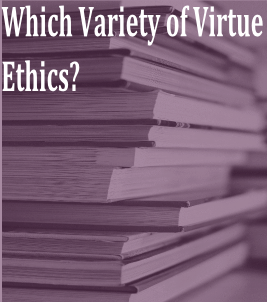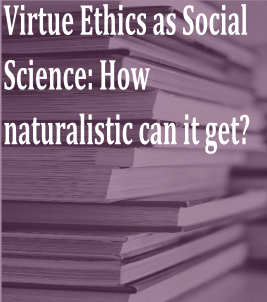![]()
Virtue ethics is a moral philosophy which emphasises an individual’s character as the key element of ethical thinking. It is rooted in the work of Greek philosopher Aristotle. It is often contrasted with other moral theories, including deontology and utilitarianism, and is experiencing a revival in the western world. At the heart of virtue ethics are three important concepts:

Although virtues can be divided into different categories, together they form a coherent, mutually supportive whole in a well-rounded life. Flourishing is the widely accepted goal of life and it is the aim of character education. Undergraduate education and postgraduate training in Law should aim to develop virtuous and confident students who are effective contributors to their professions. The ultimate aim of character education is the development practical wisdom: the capacity to choose intelligently between alternatives. In this section, you will learn about virtues and the importance of virtue ethics.
Watch this film by Professor Kristján Kristjánsson for an introduction to virtue ethics.
View the below presentation which provides an overview of virtue ethics and how it compares and contrasts to other moral theories such as deontology and utilitarianism.
![]()
![]()
Please watch this video on virtue ethics:
![]()
 Download the table on Aristotle’s concept of the ‘golden mean’. The table lists principle vices as both a deficiency and excess. Complete the table by adding the balance, or the mean virtue where prompted. You will find an example done for you.
Download the table on Aristotle’s concept of the ‘golden mean’. The table lists principle vices as both a deficiency and excess. Complete the table by adding the balance, or the mean virtue where prompted. You will find an example done for you.
Compare your answers with a fellow student and discuss any differences. Think about whether there are any character strengths that are always and intrinsically good, i.e. that aren’t seen as the golden mean between vices.
![]()
Go back to your notes and write a short definition of virtue ethics in your own words. Discuss your definition on the discussion boards.
![]()
Download the worksheet and complete the Venn diagram. Compare the similarities and differences of virtue ethics, utilitarianism and deontology.
![]()
Read the scenario below:

 Write a paragraph detailing the brief you would give to your partners in this scenario. Discuss your brief on the discussion boards.
Write a paragraph detailing the brief you would give to your partners in this scenario. Discuss your brief on the discussion boards.
![]()
Prof. Julia Annas – An examination of Nietzsche’s conception of virtue, one very different from Aristotle’s, in order to explore the issue of the grounds needed for making one conception of virtue, rather than another, central to ethical theory. | Dr. Lorraine Besser-Jones – This paper explores the viability of a fully naturalized virtue ethics by considering two avenues with the potential to establish a naturalized account of normativity: one teleological, one by analogy with health. | Dr. Katherin Barg & Prof. James Conroy – This paper reports findings of a study evaluating the effects of a Scottish character education programme on a number of secondary students’. |










